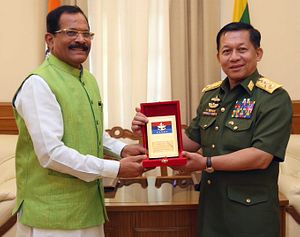On Monday, India and Myanmar signed a new memorandum of understanding on bilateral defense cooperation. The agreement is slated to deepen military-to-military ties in the areas of training, maritime security, and joint surveillance.
The agreement was signed during a visit by the Commander-in-Chief of Myanmar’s Defence Services Senior General Min Aung Hlaing. The Myanmar military, also known as the Tatmadaw, has deepened its relationship with India in recent years.
Min Aung Hlaing met senior Indian leaders, including the chief of all three major Indian armed services: Chief of Air Staff Air Chief Marshal BS Dhanoa, Chief of Army Staff General Bipin Rawat, and Chief of Naval Staff Admiral Karambir Singh.
“On conclusion of the talks, India and Myanmar signed a Memorandum of Understanding on defense co-operation,” the Indian Ministry of Defense said in a statement.
“Myanmar is a key pillar of India’s Act East Policy towards prioritizing relations with its East Asian neighbors. India has steadily increased defense co-operation with Myanmar in recent years,” the statement added.
India and Myanmar have upped their defense cooperation along their shared border, which runs along India’s restive northeastern region. The two countries concluded a coordinated border security operation against militant groups in the area earlier this year.
Apart from border cooperation, India has recently increased its prominence as a supplier of defense equipment to Myanmar. Earlier this summer, India delivered an initial batch of indigenously built torpedoes for the Myanmar navy; the total contract value is estimated at $37.9 million.
“The talks were aimed at enhancing defense cooperation, review joint exercises and training provided to the Myanmar defense services, strengthen maritime security by joint surveillance and capacity building, medical co-operation, pollution response and for developing new infrastructure,” the Indian Ministry of Defense statement continued.
Amid growing military-to-military cooperation between the Indian armed forces and the Tatmadaw, New Delhi has not been forward-leaning in its criticism of Myanmar’s treatment of the Rohingya, a persecuted Muslim minority who were pushed out of Myanmar’s Rakhine state after a systematic campaign against them by the Myanmar Army.
During a December 2018 trip to Myanmar, Indian President Ramnath Kovind did not express concern over the Rohingya crisis. Hundreds of thousands of Rohingya are currently in southeastern Bangladesh, awaiting repatriation.
“India expressed its support for the agreements reached between Myanmar and Bangladesh for the repatriation of the verified displaced persons from Rakhine State and underlined its readiness to continue to assist in addressing this complex issue,” the joint statement reads.
Last year, United Nations investigators assessed that the Tatmadaw carried out mass killings of Rohingya with “genocidal intent” and recommended the persecution of Senior General Min Aung Hlaing and other senior Tatmadaw officers.

































